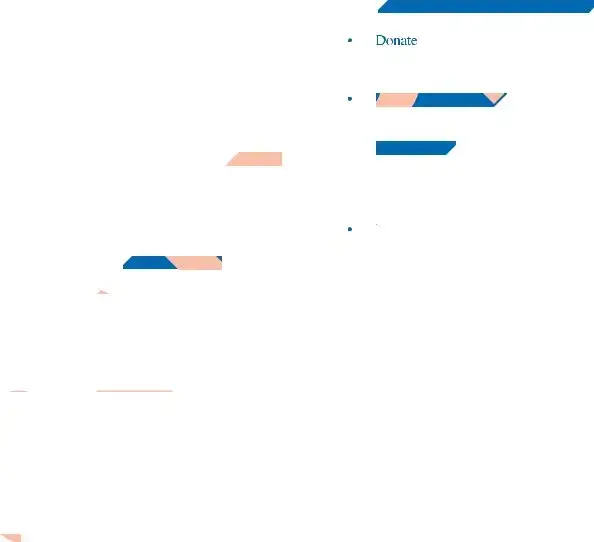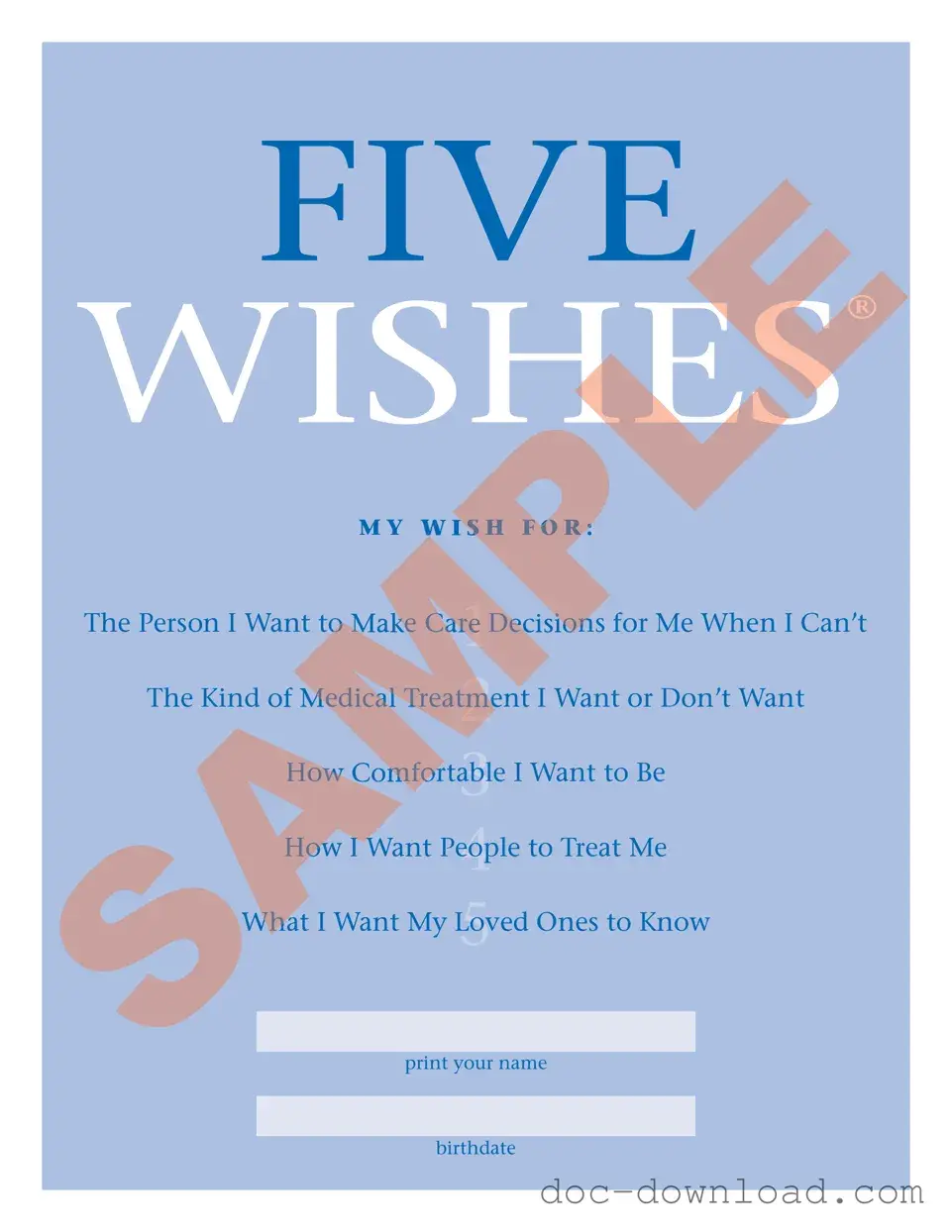Fill Out Your 5 Wishes Document Template
The Five Wishes document serves as a comprehensive tool for individuals seeking to communicate their healthcare preferences in the event of a serious illness. It encompasses five key areas: the selection of a trusted person to make healthcare decisions on one’s behalf, the specific medical treatments one desires or wishes to avoid, the level of comfort desired during treatment, the manner in which one wants to be treated by caregivers and loved ones, and important messages for family and friends. This document is designed to facilitate open discussions among family members, ensuring that they are aware of each other’s wishes and can act accordingly during challenging times. Created to address not only medical needs but also emotional and spiritual considerations, Five Wishes is recognized as the first living will of its kind. It is straightforward to complete, requiring individuals to check boxes, circle options, or write brief notes, making it accessible for a broad audience. Once signed, it holds legal validity in most states, allowing individuals to retain a degree of control over their healthcare decisions even when they are unable to voice them. With over 19 million users, Five Wishes has gained traction among various groups, including healthcare professionals, legal advisors, and community organizations, highlighting its importance in end-of-life planning.
Similar forms
The Five Wishes document is similar to a living will, which is a legal document that outlines an individual's preferences for medical treatment in situations where they are unable to communicate their wishes. Like Five Wishes, a living will allows individuals to specify the types of medical interventions they would or would not want. Both documents serve to guide healthcare providers and loved ones in making decisions that align with the individual’s values and desires during critical health situations.
Another document akin to Five Wishes is a durable power of attorney for healthcare. This legal instrument designates a specific person to make healthcare decisions on behalf of an individual if they become incapacitated. Similar to Five Wishes, it empowers a chosen representative to act in the best interests of the individual, ensuring that their healthcare preferences are honored. However, while a durable power of attorney focuses primarily on decision-making authority, Five Wishes encompasses emotional and spiritual considerations as well.
The advance directive is also comparable to the Five Wishes document. An advance directive is a broader term that includes any legal document that specifies an individual’s healthcare preferences. It can include both living wills and durable powers of attorney. Five Wishes fits within this category by providing a comprehensive approach that covers not only medical treatments but also personal comfort and emotional support, making it a more holistic option for individuals planning for future healthcare needs.
Health care proxies are another document that shares similarities with Five Wishes. A health care proxy is a person designated to make medical decisions on behalf of another individual. Like Five Wishes, it allows individuals to select someone they trust to advocate for their healthcare choices. However, Five Wishes goes further by enabling individuals to articulate their specific preferences and values, providing a clearer framework for their proxy to follow.
The Physician Orders for Life-Sustaining Treatment (POLST) form is also related to Five Wishes. POLST is a medical order that specifies the types of medical interventions a patient wishes to receive during a medical emergency. While POLST is typically used in conjunction with a living will or advance directive, it is more focused on immediate medical care decisions. In contrast, Five Wishes includes a broader range of personal and emotional preferences, allowing for a more comprehensive expression of an individual’s desires regarding end-of-life care.
For those looking to establish clear guidelines within their organization, a crucial resource is the comprehensive Employee Handbook template available online. This document provides an essential framework for defining company policies and expectations while ensuring employees understand their rights and responsibilities. To explore more about this invaluable tool, visit the key Employee Handbook resource.
Lastly, the Do Not Resuscitate (DNR) order is another document that bears resemblance to Five Wishes. A DNR order specifically instructs healthcare providers not to perform CPR if a patient stops breathing or their heart stops beating. While this document addresses a specific medical scenario, Five Wishes encompasses a wider array of wishes and preferences, offering individuals a more detailed opportunity to communicate their values and desires regarding their overall care.
Form Specifications
| Fact Name | Fact Description |
|---|---|
| Purpose | The Five Wishes document allows individuals to express their medical, emotional, and spiritual preferences for healthcare when they cannot speak for themselves. |
| Validity | Once completed and signed, the Five Wishes document is valid in most states across the U.S. |
| Age Requirement | Anyone aged 18 or older can complete the Five Wishes document, regardless of marital status. |
| Healthcare Agent | Five Wishes allows you to designate a healthcare agent to make decisions on your behalf if you are unable to do so. |
| State-Specific Laws | In states like California, Five Wishes complies with the California Health Care Decisions Law. |
| Ease of Use | The form is designed to be straightforward, requiring simple actions like checking boxes or writing brief responses. |
| Language Availability | Five Wishes is available in 27 languages, making it accessible to a diverse population. |
Different PDF Templates
Us Service Animals Esa Letter - Emotional support animals offer reliable companionship and emotional comfort.
The Colorado Quitclaim Deed form is an essential tool for those looking to transfer property ownership rights efficiently. It serves as a straightforward method often employed among family members or to rectify title discrepancies. For those seeking to create or access these forms conveniently, Colorado PDF Forms offers a reliable solution, although it's important to remember that this deed type provides less protection for buyers compared to other deed variations.
Simple P&l Statement - Forecasting future profits relies heavily on past Profit and Loss trends.
Work Application Form - References can strengthen your application.
Sample - 5 Wishes Document Form

FIVE
WISH S®
M Y W I S H F O R :
The Person I Want too Make Car1e Decisions for Me When I Can’t
The Kind of Medical Treat2ment I Want or Don’t Want
How Comfortable3 I Want to Be
How I Want People4 to Treat Me
What I Want My Loved5 Ones to Know
print your name
birthdate

Five Wishes
There are many things in life that are out of our hands. This Five Wishes document gives you a way to control somethingg very
What Is Five Wishes?
Five Wishes is the first living will that talks about your personal, emotional and spiritual needs as well as your medical wishes. It lets you choose the person you want to make health care decisions for you if you are not able to make them for yourselff. Five Wishes
lets you say exactly how you wish to be
treated if you get seriously ill. It was written with the help of The American Bar
$VVRFLDWLRQ·V&RPPLVVLRQRQ/DZDQG$JLQJ DQGWKHQDWLRQ·VOHDGLQJH[SHUWVLQHQGRIOLIH FDUH,W·VDOVRHDV\WRXVH$OO\RXKDYHWRGRLV check a box, circle a direction, or write a few
sentences.
How Five Wishes Can Help You And Your Family
• |
It lets |
you talk with your family, |
|
|
WKH\ZRQ·WKDYHWRPDNHKDUGFKRLFHV |
|||||||||
|
|
frie |
|
|
|
|
|
|
|
|
|
without knowing your wishes. |
||
|
|
nds and doctor about how you |
||||||||||||
|
|
wantt |
|
|
|
|
|
|
|
|
||||
|
|
to be treated if you become |
• You can know what your mom, dad, |
|||||||||||
|
|
seriou |
|
|
|
|
|
|
|
|||||
|
|
sly ill. |
|
|
|
|
spouse, or friend wants. You can be |
|||||||
• |
|
Your family membe |
rs will not have to |
|||||||||||
|
there for them when they need you |
|||||||||||||
|
|
|
|
|
t. It protects them |
most. You will understand what they |
||||||||
|
|
guess what you wan |
||||||||||||
|
|
|
ously ill, because |
really want. |
||||||||||
|
|
if you become seri |
||||||||||||
How Five Wishes Began
For 12 years, Jim Towey worked closely with Mother Teresa, and, for one year, he lived in a KRVSLFHVKHUDQLQ:DVKLQJWRQ'&,QVSLUHGE\ WKLVILUVWKDQGH[SHULHQFH0U7RZH\VRXJKWD way for patients and their families to plan ahead and to cope with serious illness. The result is
2Five Wishes and the response to it has been
RYHUZKHOPLQJ,WKDVEHHQIHDWXUHGRQ&11 DQG1%&·V7RGD\6KRZDQGLQWKHSDJHVRI Time and MoneyPDJD]LQHV1HZVSDSHUVKDYH called Five Wishes the first “living will with a heart and soul.” Today, Five Wishes is available in 27 languages.

Who Should Use Five Wishes
Five Wishes is for anyone 18 or older — married, single, parents, adult children, and friends. More than 19 million people of all ages have already used it. Because it
works so well, lawyers, doctors, hospitals and hospices, faith communities, employers, and retiree groups are handing outt this document.
Five Wishes States
If you live in the District of Columbia or one of the 42 states listed below, youu can use )LYH:LVKHVDQGKDYHWKHSHDFHRIPLQGWRNQRZWKDWLWVXEVWDQWLDOO\PHHWV\RXUVWDWH·V requirements under the law:
Alaska |
Illinois |
Montana |
|
6RXWK&DUROLQD |
||||||||||||
Arizona |
Iowa |
1HEUDVND |
|
|
|
|
|
|||||||||
6RXWK'DNRWD |
||||||||||||||||
Arkansas |
Kentucky |
1HYDGDD |
|
|
|
|
||||||||||
Tennessee |
||||||||||||||||
&DOLIRUQLD |
/RXLVLDQD |
|
|
|
|
|
|
|
|
|
|
|||||
|
|
|
|
|
Vermont |
|
|
|||||||||
&RORUDGR |
Maine |
1HZ0H[LFR |
|
|
|
|
Virginia |
|
|
|||||||
&RQQHFWLFXW |
Maryland |
|
|
|
RUN |
Washington |
||||||||||
1HZ< |
||||||||||||||||
Delaware |
Massachusetts |
|
|
|
|
|
|
|
|
|
West Virginia |
|||||
1RUWK&DUROLQD |
||||||||||||||||
Florida |
Michigan |
|
|
|
|
|
|
|
Wisconsin |
|||||||
1RUWK'DNRWD |
||||||||||||||||
Georgia |
Minnesota |
Oklahoma |
|
|
|
Wyoming |
||||||||||
Hawaii |
Mississippi |
|
|
|
|
|
|
|
|
|
|
|
||||
|
Pennsylvania |
|
|
|
|
|
||||||||||
Idaho |
Missouri |
|
|
|
|
|
|
|
|
|||||||
Rhode Island |
|
|
|
|
|
|||||||||||
If your state is not one of the 42 states listed here, Five Wishes does not meet the technical UHTXLUHPHQWVLQWKHVWDWXWHVRI\RXUVWDWH6RVRPHGRFWRUVLQ\RXUVWDWHPD\EHUHOXFWDQW to honor Five Wishes. However, many people from states not on this list do complete Five :LVKHVDORQJZLWKWKHLUVWDWH·VOHJDOIRUP7KH\ILQGWKDW)LYH:LVKHVKHOSVWKHPH[SUHVV all that they want and provides a helpful guide to family members, friends, care givers and doctors. Most doctors and health care professionals know they need to listen to your wishes no matter how you express them.
How Do I Change To Five Wishes?
You may already have a living will or a durable power of attorney for health care. If you want to use Five Wishes instead, all you need to do is fill out and sign a new Five Wishes as directed. As soon as you sign it, it takes away any advance directive you had before. To make sure the right form is used, please do the following:
• |
D |
estroy all copies of your old living will |
• |
7HOO\RXU+HDOWK&DUH$JHQWIDPLO\ |
|
or durable power of attorney for health |
|
members, and doctor that you have |
|
|
care. Or you can write “revoked” in large |
|
filled out a new Five Wishes. |
|
|
letters across the copy you have. Tell |
|
Make sure they know about your |
|
|
your lawyer if he or she helped prepare |
|
new wishes. |
|
|
those old forms for you. AND |
|
|
|
3

WISH 1
The Person I Want To Make Health Care Decisions For Me
When I Can’t Make Them For Myself.
f I am no longer able to make my own health care |
|
|
|
• My attending or treating doctor finds I am no |
|||||||||||||||
I decisions, this form names the person I choose to |
|
|
|
|
longer able to make health ca |
|
es, AND |
||||||||||||
|
|
|
|
re choic |
|||||||||||||||
|
|
|
|
|
|
|
|
|
|
|
|
E |
|
|
|
|
|||
make these choices for me. This person will be my |
|
|
|
• Another health care profe |
ssional agrees |
t |
hat |
||||||||||||
Health Care Agent (or other term that may be used in |
|
|
|
|
this is true. |
|
|
|
|
|
|
|
|
|
|||||
|
MPLE |
||||||||||||||||||
my state, such as proxy, representative, or surrogate). |
|
|
If my state has a different |
|
w |
ay of finding that I am not |
|
||||||||||||
This person will make my health care choices if both |
|
|
able to make health c |
|
are choices, then my state’s way |
|
|||||||||||||
of these things happen: |
|
|
|
should be followe |
d. |
|
|
|
|
|
|
|
|
|
|||||
|
|
|
|
|
|
|
|
|
|
|
|
|
|||||||
|
|
|
|
|
|
|
|
|
|
|
|
|
|
|
|
|
|
|
|
The Person I Choose As My Health Care Agent Is: |
|
|
|
|
|
|
|
|
|
||||||||||
|
|
|
|
|
|
|
|
|
|
|
|
|
|
|
|
|
|
|
|
|
|
|
|
|
|
|
|
|
|
|
|
|
|
|
|
|
|
|
|
First Choice Name |
|
|
Ph |
|
|
|
|
|
|
|
|
|
|
|
|
|
|
|
|
|
|
one |
|
|
|
|
|
|
|
|
|
||||||||
|
|
|
|
|
|
|
|
|
|
|
|
|
|
|
|
|
|
|
|
Address |
|
|
|
|
|
|
|
|
|
|
|
|
|
|
|
|
|
|
|
|
|
|
|
|
|
|
|
|
|
|
|
|
|
|
|
|
|||
|
|
City/State/Zip |
|
|
|
|
|
|
|
|
|
||||||||
If this person is not able or willing to make thesee choices for me, OR is divorced or legally separated from me, OR this person has died, then these people aree my next choices:
Second Choice Name |
|
|
|
|
|
e |
|||||||||||||
|
Third Choice Nam |
||||||||||||||||||
|
|
|
|
|
|
|
|
||||||||||||
Address |
|
A |
|
|
|
|
|
||||||||||||
|
ddress |
|
|
|
|||||||||||||||
|
|
|
|
|
|
|
|
|
|||||||||||
City/State/Zip |
|
|
City/State/Zip |
||||||||||||||||
|
|
|
|
|
|
|
|
|
|
|
|
|
|
|
|
|
|
|
|
Phone |
|
Phone |
|
|
|
||||||||||||||
|
|
|
|
|
|
|
|
|
|
|
|
|
|
|
|
|
|
||
Picking The R |
|
Your Health Care Agent |
|
||||||||||||||||
ight Person To Be |
|
||||||||||||||||||
|
|||||||||||||||||||
|
|
|
&KRRVHVRPHRQHZKRNQRZV\RXYHU\ZHOO |
DQGIROORZ\RXUZLVKHV<RXU+HDOWK&DUH |
|||||||||||||||
|
|
|
|||||||||||||||||
|
|
|
|
|
|
|
|
can make difficult |
Agent should be at least 18 years or older (in |
||||||||||
cares about you, and who |
|||||||||||||||||||
|
|
|
|
|
|
|
ily member may |
&RORUDGR\HDUVRUROGHUDQGVKRXOGnot be: |
|||||||||||
decisions. A spouse or fam |
|||||||||||||||||||
|
not be the best choice because they are too |
|
|
• |
Your health care provider, including the |
||||||||||||||
|
|
|
|
|
|
|
YHG6RPHWLPHVWKH\are the |
|
|
||||||||||
|
HPRWLRQDOO\LQYRO |
||||||||||||||||||
|
|
|
|
|
owner or operator of a health or residential |
||||||||||||||
|
|
|
|
|
|
|
|
|
|
|
|
|
|
|
|
||||
|
EHVWFKRLFH<RX |
NQRZEHVW&KRRVHVRPHRQH |
|
|
|
|
|||||||||||||
|
|
|
|
|
or community care facility serving you. |
||||||||||||||
w |
ho is able to stand up for you so that your |
|
|
|
|
||||||||||||||
|
|
|
|
|
|
|
|||||||||||||
|
wishes are followed. Also, choose someone who |
|
|
• |
An employee or spouse of an employee of |
||||||||||||||
is likely to be nearby so that they can help when |
|||||||||||||||||||
|
|
|
|
your health care provider. |
|||||||||||||||
you need them. Whether you choose a spouse, |
|
|
|
|
|||||||||||||||
|
|
|
|
|
|
|
|||||||||||||
SAMIDPLO\PHPEHURUIULHQGDV\RXU+HDOWK&DUH |
|
|
6HUYLQJDVDQDJHQWRUSUR[\IRURU |
||||||||||||||||
Agent, make sure you talk about these wishes |
|
|
|
|
more people unless he or she is your |
||||||||||||||
and be sure that this person agrees to respect |
|
|
|
|
spouse or close relative. |
||||||||||||||
|
|
|
|
|
|
|
|
|
|
|
|
|
|
|
|
|
|
|
|
4

I understand that my Health Care Agent can make health care decisions for me. I want my Agent to be able to do the
following: (Please cross out anything you don’t want your Agent to do that is listed below.)
• |
Make choices for me about my medical care |
|
6HH DQGDSSURYHUHOHDVHRIP\PHGLFDOUHFRUGV |
|||||
|
or services, like tests, medicine, or surgery. |
|
and personal files. If I need to sign my name to |
|||||
|
This care or service could be to find out what my |
|
JHWDQ\RIWKHVHILOHVP\+HDOW |
|
$JHQWFDQ |
|||
|
|
K&DUH |
||||||
|
health problem is, or how to treat it. It can also |
|
sign it for me. |
|||||
|
include care to keep me alive. If the treatment or |
• |
Move me to another |
|
|
|
|
|
|
FDUHKDVDOUHDG\VWDUWHGP\+HDOWK&DUHAgent |
state to get the care I need |
|
|||||
|
|
or to carry out m |
y wishes. |
|||||
|
can keep it going or have it stopped. |
|
||||||
|
|
|
|
|
|
|
|
|
•Interpret any instructions I have given in
this form or given in other discussions, according
WRP\+HDOWK&DUH$JHQW·VXQGHUVWDQGLQJRIP\ wishes and values.
&RQVHQWWRDGPLVVLRQWRDQDVVLVWHGOLYLQJIDFLOLW\ hospital, hospice, or nursing home for me. My +HDOWK&DUH$JHQWFDQKLUHDQ\NLQGRIKHDOWK care worker I may need to help me or take care of me. My Agent may also fire a health care worker, if needed.
•Make the decision to request, take away or not
JLYHPHGLFDOWUHDWPHQWVLQFOXGLQJDUWLILFLDOO\ provided food and water, andd any other treatments to keepp me alive.
•Authorize or refuse to authorize any medication or procedure needed to help with pain.
•Take any legal action needed to carry out my wishes.
•Donate useable organs or tissues of mine as allowed by law.
 • Apply for Medicare, Medicaid, or other programs RULQVXUDQFHEHQHILWVIRUPH0\+HDOWK&DUH Agent can see my personal files, like bank records, to find out what is needed to fill out these forms.
• Apply for Medicare, Medicaid, or other programs RULQVXUDQFHEHQHILWVIRUPH0\+HDOWK&DUH Agent can see my personal files, like bank records, to find out what is needed to fill out these forms.
/LVWHGEHORZDUHDQ\FKDQJHVDGGLWLRQVRU OLPLWDWLRQVRQP\+HDOWK&DUH$JHQW·VSRZHUV
______________________________________________________________________________
______________________________________________________________________________
______________________________________________________________________________
______________________________________________________________________________
______________________________________________________________________________
______________________________________________________________________________
______________________________________________________________________________
If I Change My Mind About Having A Health Care Agent, I Will
• |
Destroy all copies of this part of the |
• Write the word “Revoked” in large |
|
|
Five Wishes form. OR |
letters across the name of each agent |
|
• Tell someone, such as my doctor or |
whose authority I want to cancel. |
||
6LJQP\QDPHRQWKDWSDJH |
|||
|
family, that I want to cancel or change |
||
|
|
||
|
P\+HDOWK&DUH$JHQWOR |
|
|
5

WISH 2
My Wish For The Kind Of Medical Treatment
I Want Or Don’t Want.
I b elieve that my life is precious and I deserve to be treated with dignity. When the timee comes that
I am very sick and am not able to speak for myself, I want the following wishes, and any other directions I have given to my Health Care Agent, to be respected and followed.
What You Should Keep In Mind As My Caregiver
•I do not want to be in pain. I want my doctor to give me enough medicine to relieve my pain, even if that means that I will be drowsy or sleep more than I would otherwise.
•I do nott want anything done or omitted by my doctors or nurses with the intention of taking my life.
•I want to be offered food and fluids by mouth, and kept clean and warm.
What
/LIHVXSSRUWWUHDWPHQWPHDQVDQ\PHGLFDOSURFH dure, device or medication to keep me alive.
/LIHVXSSRUWWUHDWPHQWLQFOXGHVPHGLFDO devices put in me to help me breathe; food and ZDWHUVXSSOLHGE\PHGLFDOGHYLFHWXEHIHHGLQJ FDUGLRSXOPRQDU\UHVXVFLWDWLRQ&35PDMRU surgery; blood transfusions; dialysis; antibiotics;
and anything else meant to keep me alive.
,I,ZLVKWROLPLWWKHPHDQLQJRIOLIHVXSSRUW treatment because of my religious or personal beliefs, I write this limitation in the space below. I do this to make very clear what I want and under what conditions.
_________________________________________________________________________________________
_________________________________________________________________________________________
_________________________________________________________________________________________
_________________________________________________________________________________________
_________________________________________________________________________________________
In Case Of An Emergency
Iff you have a medical emergency and ambulance personnel arrive, they may look to see if you have a Do Not Resuscitate form or bracelet. Many states require a person to have a Do Not Resuscitate form filled out and
signed by a doctor. This form lets ambulance SHUVRQQHONQRZWKDW\RXGRQ·WZDQWWKHPWRXVH OLIHVXSSRUWWUHDWPHQWZKHQ\RXDUHG\LQJ3OHDVH check with your doctor to see if you need to have a Do Not Resuscitate form filled out.
6

Here is the kind of medical treatment that I want or don’t want in the four situations listed below. I want my Health Care Agent, my family, my doctors and other health care providers, my friends and all others to know these directions.
Close to death:
If my doctor and another health care professional both decide that I am likely to die within a short period of WLPHDQGOLIHVXSSRUWWUHDWPHQWZRXOGRQO\GHOD\WKH PRPHQWRIP\GHDWK&KRRVHoneRIWKHIROORZLQJ
❏ ,ZDQWWRKDYHOLIHVXSSRUWWUHDWPHQW
❏ , GRQRWZDQWOLIHVXSSRUWWUHDWPHQW,ILWKDV been started, I want it stopped.
❏,ZDQWWRKDYHOLIHVXSSRUWWUHDWPHQWLIP\GRFWRU believes it could help. But I want my doctor to
VWRSJLYLQJPHOLIHVXSSRUWWUHDWPHQWLILWLVQRW helping my health condition or symptoms.
In A Coma And Not Expected Too Wake Up Or Recover:
If my doctor and another health care professional both decide that I am in a coma from which I am not expected WRZDNHXSRUUHFRYHUDQG,KDYHEUDLQGDPDJHDQGOLIH support treatment would only delay the moment of my GHDWK&KRRVHoneRIWKHIROORZLQJ
❏ ,ZDQWWRKDYHOLIHVXSSRUWWUHDWPHQW
❏ , GRQRWZDQWOLIHVXSSRUWWUHDWPHQW,ILWKDV been started, I want it stopped.
❏,ZDQWWRKDYHOLIHVXSSRUWWUHDWPHQWLIP\GRFWRU believes it could help. But I want my doctor to
VWRSJLYLQJPHOLIHVXSSRUWWUHDWPHQWLILWLVQRW helping my health condition or symptoms.
Permanent And Severe Brain Damage And Not Expected To Recover:
If my doctor and another health care professional both decide that I have permanentt and severe brain damage,
(for example, I can open myy eyes, but I can not speak RUXQGHUVWDQGDQG,DPQRWH[SHFWHGWRJHWEHWWHUDQG OLIHVXSSRUWWUHDWPHQWZRXOGRQO\GHOD\WKHPRPHQWRI P\GHDWK&KRRVHoneRIWKHIROORZLQJ
❏ ,ZDQWWRKDYHOLIHVXSSRUWWUHDWPHQW
❏ ,GRQRWZDQWOLIHVXSSRUWWUHDWPHQW,ILWKDV been started, I want it stopped.
❏,ZDQWWRKDYHOLIHVXSSRUWWUHDWPHQWLIP\GRFWRU believes it could help. But I want my doctor to
VWRSJLYLQJPHOLIHVXSSRUWWUHDWPHQWLILWLVQRW helping my health condition or symptoms.
In Another Condition Under Which I Do Not Wish To Be Kept Alive:
If there is another condition under which I do not wish WRKDYHOLIHVXSSRUWWUHDWPHQW,GHVFULEHLWEHORZ,Q this condition, I believe that the costs and burdens of
OLIHVXSSRUWWUHDWPHQWDUHWRRPXFKDQGQRWZRUWKWKH benefits to me. Therefore, in this condition, I do not want OLIHVXSSRUWWUHDWPHQW)RUH[DPSOH\RXPD\ZULWH ´HQGVWDJHFRQGLWLRQµ7KDWPHDQVWKDW\RXUKHDOWKKDV gotten worse. You are not able to take care of yourself in DQ\ZD\PHQWDOO\RUSK\VLFDOO\/LIHVXSSRUWWUHDWPHQW will not help you recover. Please leave the space blank if \RXKDYHQRRWKHUFRQGLWLRQWRGHVFULEH
________________________________________________________________________________________
________________________________________________________________________________________
________________________________________________________________________________________
________________________________________________________________________________________
________________________________________________________________________________________
7

Th e next three wishes deal with my personal, spiritual and emotional wishes. They are important to me. I want to be treated with dignity near the end of my life, so I would like people to do the things
written in Wishes 3, 4, and 5 when they can be done. I understand that my family, my doctors and other health care providers, my friends, and others may not be able to do these things or are not required by law to do these things. I do not expect the following wishes to place new or added legal duties on my doctors or other health care providers. I also do not expect these wishes to excuse my doctor or other health care providers from giving mee the proper care asked for by law.
WISH 3
My Wish For How Comfortable I Want To Bee.
(Please cross out anything that you don’t agree with.)
•I do not want to be in pain. I want my doctor to give me enough medicine to relieve my pain, even if that means I will be drowsy or sleep more than I would otherwise.
•If I show signs of depression, nausea, shortness of breath, or hallucinations, I want my care givers to do whatever they can to help me.
•I wish to have a cool moist cloth put onn my head if I have a fever.
•I want my lips and mouth kept moist to stop dryness.
•I wish to have warm baths often. I wish to be kept fresh and clean at all times.
•I wishh to be massaged with warm oils as often as I can be.
•I wish to have my favorite music played when possible until my time of death.
•I wish to have personal care like shaving, nail clipping, hair brushing, and teeth brushing, as long as they do not cause me pain or discomfort.
,ZLVKWRKDYHUHOLJLRXVUHDGLQJVDQGZHOO loved poems read aloud when I am near death.
•I wish to know about options for hospice care to provide medical, emotional and spiritual care for me and my loved ones.
WISH 4
My Wish For How I Want People To Treat Me.
(Please cross out anything that you don’t agree with.)
•I wish to have people with me when possible. I want someone to be with me when it seems that death may come at any time.
•I wish to have my hand held and to be talked
WRZKHQSRVVLEOHHYHQLI,GRQ·WVHHPWR respond to the voice or touch of others.
•I wish to have others by my side praying for me when possible.
•I wish to have the members of my faith community told that I am sick and asked to pray for me and visit me.
•I wish to be cared for with kindness and cheerfulness, and not sadness.
•I wish to have pictures of my loved ones in my room, near my bed.
•If I am not able to control my bowel or bladder functions, I wish for my clothes and bed linens to be kept clean, and for them to be changed as soon as they can be if they have been soiled.
•I want to die in my home, if that can be done.
8

WISH 5
My Wish For What I Want My Loved Ones To Know.
(Please cross out anything that you don’t agree with.)
•I wish to have my family and friends know that I love them.
•I wish to be forgiven for the times I have hurt my family, friends, and others.
•I wish to have my family, friends and others know that I forgive them for when they may have hurt me in my life.
•I wish for my family and friends to know that I do not fear death itself. I think it is not the end, but a new beginning for me.
•I wish for all of my family members to make peace with each other before my death, if they can.
•I wish for my family and friends to think about what I was like before I became seriously ill. I want them too remember me in this way after my death.
•I wish for my family and friends and caregivers to respect my wishes even if
WKH\GRQ·WDJUHHZLWKWKHP
•I wish for my family and friends to look at my dying as a time of personal growth for everyone, including me. This will help me livee a meaningful life in my final days.
•I wish for my family and friends to get counseling if they have trouble with my death. I want memories of my life to give
WKHPMR\DQGQRWVRUURZ
•After my death, I would like my body to
EHFLUFOHRQHEXULHGRUFUHPDWHG
•My body or remains should be put in the
|
following |
location |
. |
•The following person knows my funeral
wishes:.
If anyone asks how I want to be remembered, please say the following about me:
_________________________________________________________________________________
_________________________________________________________________________________
_________________________________________________________________________________
If there is to bee a memorial service for me, I wish for this service to include the following
OLVWPXVLFVRQJVUHDGLQJVRURWKHUVSHFLILFUHTXHVWVWKDW\RXKDYH
_________________________________________________________________________________
_________________________________________________________________________________
_________________________________________________________________________________
(Please use the space below for any other wishes. For example, you may want to donate any or all parts of your body when you die. You may also wish to designate a charity to receive memorial contributions. Please attach a VH DUDWHVKHHWRI D HULI\RXQHHGPRUHVSDFH
______________________________________________________________________________________
______________________________________________________________________________________
______________________________________________________________________________________
9

Signing The Five Wishes Form
Please make sure you sign your Five Wishes form in the presence of the two witnesses.
I, _________________________________, ask that my family, my doctors, and other health care providers,
P\IULHQGVDQGDOORWKHUVIROORZP\ZLVKHVDVFRPPXQLFDWHGE\P\+HDOWK&DUH$JHQWLI,KDYHRQHDQGKH RUVKHLVDYDLODEOHRUDVRWKHUZLVHH[SUHVVHGLQWKLVIRUP7KLVIRUPEHFRPHVYDOLGZKHQ,DPXQDEOHWRPDNH decisions or speak for myself. If any part of this form cannot be legally followed, I ask that all other parts of this form be followed. I also revoke any health care advance directives I have made before.
Signature: |
|
|
___ |
|||
Address: |
|
|
|
|
|
|
Phone: |
Date: |
|
|
__ |
||
Witness Statement • (2 witnesses needed):
,WKHZLWQHVVGHFODUHWKDWWKHSHUVRQZKRVLJQHGRUDFNQRZOHGJHGWKLVIRUPKHUHDIWHU´SHUVRQµLVSHUVRQDOO\NQRZQWR PHWKDWKHVKHVLJQHGRUDFNQRZOHGJHGWKLV>+HDOWK&DUH$JHQWDQGRU/LYLQJ:LOOIRUPV@LQP\SUHVHQFHDQGWKDWKHVKH appears to be of sound mind and under no duress, fraud, or undue influence.
,DOVRGHFODUHWKDW,DPRYHU\HDUVRIDJHDQGDP127
•The individual appointed as (agent/proxy/
VXUURJDWHSDWLHQWDGYRFDWHUHSUHVHQWDWLYHE\ this document or his/her successor,
•7KHSHUVRQ·VKHDOWKFDUHSURYLGHULQFOXGLQJ RZQHURURSHUDWRURIDKHDOWKORQJWHUPFDUH or other residential or community care facility serving the person,
•$QHPSOR\HHRIWKHSHUVRQ·VKHDOWKFDUH provider,
•)LQDQFLDOO\UHVSRQVLEOHIRUWKHSHUVRQ·V health care,
•An employee of a life or health insurance provider for the person,
•Related to the person by blood, marriage, or adoption, and,
•To the best of my knowledge, a creditor of the person or entitled to any part of his/her estate under a will or codicil, by operation of law.
(Some states may have fewer rules about who may be a witness. Unless you know your state’s rules, please follow the above.)
|
|
|
|
|
|
|
|
|
Signature of Witness |
|
|
|
|
Signature of Witness #2 |
|||
#1 |
|
|||||||
|
|
|
|
|
|
|
|
|
Printed Name of Witn |
|
|
|
|
|
Printed Name of Witness |
||
ess |
|
|||||||
|
|
|
|
|
|
|
|
|
Address |
|
Address |
||||||
|
|
|
|
|
|
|
|
|
|
|
|
|
Phone |
||||
Phone |
|
|||||||
|
||||||||
Notarization • Only required for residents of Missouri, North Carolina, South Carolina and West Virginia
•If you live in Missouri, only your signature should be notarized.
•,I\RXOLYHLQ1RUWK&DUROLQD6RXWK&DUROLQDRU:HVW9LUJLQLD you should have your signature, and the signatures of your witnesses, notarized.
67$7(2)BBBBBBBBBBBBBBBBBBBBBBBBBBBBBBBBBBB&2817<2)BBBBBBBBBBBBBBBBBBBBBBBBBBBBBBBB
2QWKLVBBBBBGD\RIBBBBBBBBBBBBBBBBBBBBBBBWKHVDLGBBBBBBBBBBBBBBBBBBBBBBBBBBBBBBBBBBBBBBBBBBBBBBBBBBBBBBBB BBBBBBBBBBBBBBBBBBBBBBBBBBBBBBBDQGBBBBBBBBBBBBBBBBBBBBBBBBBBBBBBNQRZQWRPHRUVDWLVIDFWRULO\SURYHQWREHWKHSHUVRQQDPHGLQWKH IRUHJRLQJLQVWUXPHQWDQGZLWQHVVHVUHVSHFWLYHO\SHUVRQDOO\DSSHDUHGEHIRUHPHD1RWDU\3XEOLFZLWKLQDQGIRUWKH6WDWHDQG&RXQW\DIRUHVDLGDQG acknowledged that they freely and voluntarily executed the same for the purposes stated therein.
0\&RPPLVVLRQ([SLUHV |
BBBBBBBBBBBBBBBBBBBBBBBBBBBBBBBBBBBBBBBBBBBBBBBBBBBBBBBBBBBBBBBBBBBBBBBB |
|||||
10 |
1RWDU\3XEOLF |
|||||
